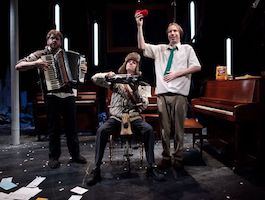Pianos Abused: Schubert and Beethoven in New York
|
Grant Chu Covell [January 2011.]
The staged entertainment Three Pianos consists of three guys hanging out, knocking back drinks, and stumbling through Schubert’s 1827 Winterreise. There’s a precedent for such behavior: We know Schubert used to party with his friends and that Winterreise was premiered at a similar gathering. The play has problems. Despite best intentions, Rick Burkhardt, Alec Duffy and Dave Malloy are weak singers and lackluster pianists. The trio butchers the few songs they attempt, warranting a countdown as the evening progresses. If Winterreise is new to you, their performances provide little evidence of how sad and beautiful the music is. The trio is cute when they bounce between the title’s uprights, constantly repositioned like a preschool’s building blocks. The plot includes dress-ups posing as Music History 101 lectures and revelations that one of the three is recovering from a breakup. I expected someone to die before the house lights came back on, and was disappointed when the action failed to take that direction. We’re supposed to think that Schubert’s song cycle needs to be dumbed down for present-day consumption. Here I am, an elitist critic, suggesting that it would have been better to spin a recording and leave it at that. I’ve professed a fascination for Winterreise arrangements (here and here) and was open to a fresh perspective. Admittedly, the accordion, glockenspiel, and a cappella touches played nicely, as did the concrète scene-change bits. But my understanding of Winterreise wasn’t enriched, nor can I accept that the group’s enthusiasm validates shoddiness. A bit of posturing to suggest that the play itself is an inferior construct goes nowhere. The dialogue, coyly incorporating mobile phones and YouTube, brings us no closer to Schubert’s milieu or intentions. Ignored are suggestions that the composer, dying of syphilis, was probably gay. I went to a music school, and such all-night delves do happen. But to perpetuate such juvenilia and charge admission? To facilitate the Schubertiadic mood, the audience is permitted to quaff complimentary merlot. Perhaps I’d have taken a rosier view of this foolishness had I refilled my cup more often. Maybe that’s the point — the show’s popularity owes to free-flowing plonk. * * * Another piano catches hell a few blocks uptown: Jennifer Allora and Guillermo Calzadilla’s collaboration on Stop, Repair, Prepare: Variations on Ode to Joy for a Prepared Piano (2008). A disfigured Bechstein grand reveals a tidily sawed circle traversing soundboard, strings and top. A pianist, standing in the hole, leans over the keyboard to deliver an upside-down arrangement of the Finale of Beethoven’s Ninth. The piano is on wheels so that he is able to stroll about. The transcription straddles the missing midrange and, from inside the instrument, strings are easily reached for plucking and strumming. I had hoped the arrangement would use keys that no longer struck strings. No such luck. The arrangement doesn’t exactly follow the original, yet liberties are to be expected. Except for the meandering, the performance might have been more effective, at least more interesting, had a recording emanated from the piano body. (Joseph Beuys’ felt-encased piano came to mind.) Visiting other galleries, one hears Beethoven drifting over the noise. Looking over a balcony, I noted group civility: the crowd yielding to the wandering musician. Kudos withal to the pianistic bullpen that had to relearn the keyboard and propel the instrument. And high marks to whoever drilled the hole. I wondered how someone might practice this at home (belly down on the lid?) until I realized that most everyone has an electronic keyboard. Sitting on the wrong side of the instrument is no problem at all. [Three Pianos runs at the New York Theater Workshop (http://www.nytw.org/) until January 16, 2011. Stop, Repair, Prepare: Variations on Ode to Joy for a Prepared Piano is at the Museum of Modern Art (http://www.moma.org/) until January 10, 2011.]
[More Grant Chu Covell]
[Previous Article:
Rocket Science]
[Next Article:
Armchair Operas 6.]
|
